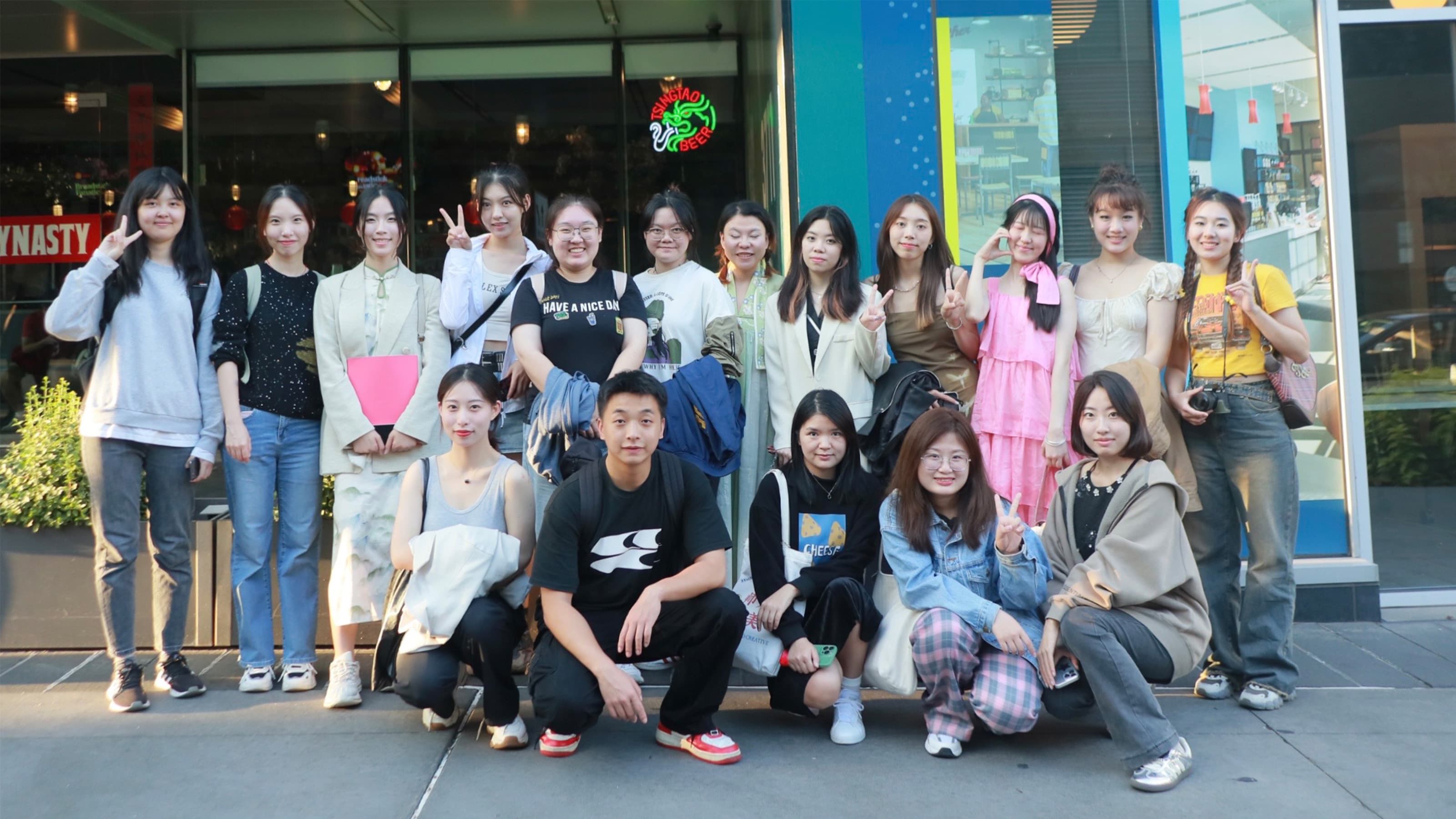Inaugural Class of Joint Early Childhood Education Program with China Arrives in Philadelphia
After completing the first year of a joint master’s in early childhood education program in China between Saint Joseph’s and Hunan Normal University, the inaugural cohort of 20 students is now on Hawk Hill, engaging in field work and immersing themselves in the American education system.
 Photo by Yao Xue
Photo by Yao Xue
Twenty students from China’s Hunan Normal University (HNNU) arrived on Hawk Hill at the start of the fall semester. It wasn’t the group’s first time meeting members of the Saint Joseph’s University community though — the graduate students are in their second year of a joint master’s in early childhood education program between the two universities, which launched in 2022.
The 1+1 program stems from a nearly decade’s long partnership with HNNU, which began with the sponsorship of exchange students and visiting delegations from each institution. In recent years, China’s Ministry of Education (MOE) has placed a strong emphasis on early childhood education, which highlighted yet another opportunity for collaboration.
“Early childhood education is an underserved market in China,” explains Julie Yu, director of Saint Joseph’s Office of China Programs. “That’s why we first initiated the program: Both universities have a strong background in education programs.”
During the first year of the program, HNNU students were taught by faculty in Saint Joseph’s Department of Teacher Education. While the classes were initially intended to be taught in person in Changsha, China, travel restrictions caused by the COVID-19 pandemic moved instruction online.
“‘I’ve had the privilege of teaching the students both online and [now] in person,” says Monica Belfatti, PhD, assistant professor of teacher education, faculty advisor and program director of the HNNU cohort. “I’m currently teaching Science Methods and taught Literacy Methods virtually in the spring.”
At the end of the first year, the students had the option to continue their studies on Saint Joseph’s campus; while the goal was to attract a third of the 30-student cohort, 20 HNNU students packed their bags and headed to Philadelphia, where they were greeted by various faculty and staff during a two-week orientation.
“I vividly remember the genuine enthusiasm and friendliness of faculty and staff who welcomed us, even picking us up at the airport,” says Jiayi Ning ’24 (MS). “Their support created a sense of community from the beginning, providing valuable information about campus life and cultural adjustment.”

With the cohort now in the same time zone as their instructors, they’ve been able to take classes in person and immerse themselves in the American education system. Part of that experience includes participating in field work — a main component of Saint Joseph’s teacher education curriculum. For one morning a week, the students spend time in local schools connecting theory and practice.
“It’s exciting for them to see practices in American kindergartens and compare them to practices in Chinese kindergartens,” says Belfatti. “It’s been a learning experience for them but also for the professors here at St. Joe’s because we’re learning from their global perspectives. It’s a very mutually beneficial relationship.”
The semester prior, the students completed an intensive internship in a kindergarten in China.
“These experiences shaped my educational philosophy, integrating diverse practices,” reflects Jingying Yang ’24 (MS). “With knowledge from both countries, I aim to contribute to the innovation and development of early childhood education.”
Back in the classroom, the coursework matches the curriculum of Saint Joseph’s childhood education programs, with foundational work focused on early childhood development, as well as methods courses looking at how to teach social studies, science, literacy and mathematics.
The cohort is taking classes as a group, allowing them to benefit from personalized instruction and small class sizes, while also giving them the opportunity to acclimate to American culture and improve their language skills.
“One of the benefits is their ability to use translanguaging. So, the students get in groups and talk to each other in Chinese and use their first language as a resource to process new content. They then work together to translate their ideas and thoughts into their second language, which is English, and share them with the class,” explains Belfatti.
With knowledge from both countries, I aim to contribute to the innovation and development of early childhood education.
Jingying Yang ’24 (MS)
At the end of their two-year journey, the students will have earned dual degrees from Hunan Normal University and Saint Joseph’s University. Thus far, SJU is the only Jesuit university to have a joint 1+1 program accredited by China’s Ministry of Education.
“I’ve talked with many of the students and their plan is to return to China to work in international early childhood centers or international preschools, so the dual degree is really beneficial to their careers,” says Yu.
As the first cohort wraps up their studies, a second cohort of 31 students has begun their program at HNNU, this time in person with professor emerita Ailing Kong in China.
Yu hopes that the success of the joint degree program will serve as a model for other fields and colleges at Saint Joseph’s to roll out similar programming.
“Collaborating with our Chinese strategic partners — especially esteemed universities like HNNU — increases SJU's standing in the global education environment,” says Yu. “This collaboration stands to help SJU attract greater numbers of high-caliber international students and becomes a valuable platform for setting academic connections and establishing resource-sharing relationships with our international partners.”
